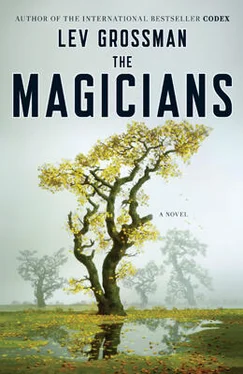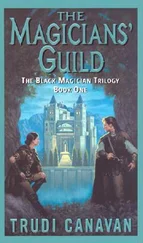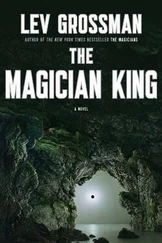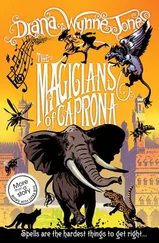For a minute he writhed in Alice’s grip. His eyebrows were gone, and his face was comically blackened. Quentin could hear the Alice-dragon panting raggedly. The Beast shuddered and was still for a moment. Then he appeared to compose himself, and he punched Alice once, hard, in the face.
Instantly she was human again. Her nose was bleeding. Martin rolled neatly to one side and got to his feet. Naked though he was, he produced a clean handkerchief from somewhere and used it to dab some of the soot from his face.
“Dammit,” Quentin rasped. “Somebody do something! Help her!”
Janet got one last bullet in and fired, then she threw the pistol overhand. It bounced off the back of Martin Chatwin’s head without mussing his hair.
“Fuck you!” she shouted.
Martin took a step toward Alice. No. This had to end.
“Hey, asshole!” Quentin managed. “You forgot one thing.”
He spat blood and switched to his best Cubano accent, his voice cracking hysterically: “Say hello to my leel friend!”
Quentin whispered the catchword Fogg had given him the night of graduation. He’d imagined it in his head a hundred times, and now as he pronounced the final syllable something big and hard was struggling and thrashing under his shirt, scrabbling at the skin of his back.
Looking up at it, Quentin noticed that his cacodemon was wearing a little pair of round spectacles hooked over its pointy ears. What the fuck, his cacodemon had glasses? It stood over him, uncertain, looking learned and thoughtful. It didn’t know whom to fight.
“The naked guy,” Quentin said in a hoarse whisper. “Go! Save the girl!”
The demon skidded to a stop ten feet from its prey. It feinted left, then left again, like it was playing one-on-one with Martin, trying to break his ankles, before it gathered itself and sprang directly for his face. Wearily, as if to express to them the unfairness of the trouble they were putting him through, Martin put up a hand to catch it in flight. The demon tore at his fingers, hissing. Martin began slowly stuffing it into his mouth, like a gecko eating a spider, while it pulled his hair and gouged at his eyes.
Quentin waved at Alice frantically to run — maybe if they all split up? — but she wasn’t looking at him. She licked her lips and tucked her hair behind her ears with both hands. She got to her feet.
Something had changed in her face. She had made a decision. She began to work with her hands, the preliminaries to something very advanced. At the sound both Martin and the cacodemon looked at her. Martin took the opportunity to break the demon’s neck and push the rest of its body into his mouth.
“So,” she said. “So you think you’re the biggest monster in this room?”
“Don’t,” Janet said, but Alice didn’t stop. She was trying something. Everybody seemed to get it except Quentin.
“No, no, no!” Eliot said angrily. “Wait!”
“You’re not even a magician at all, are you, Martin?” Alice said quietly. “You’re just a little boy. That’s all you are. That’s all you ever were.” She bit back a sob. “Well, I’m sorry.”
She closed her eyes and began to recite. Quentin could see it all in Alice’s face, everything they’d been through, everything they’d done to each other, everything they’d gotten past. She was letting it all come out. It was a big spell, Renaissance, very academic magic. Big energies. He couldn’t imagine what good it would do, but a moment later he realized the spell wasn’t the point. The side effects were the point.
He began scratching his way toward her, anything he could do to get closer. He didn’t care if it killed him.
“No!” he shouted. “No!”
The blue fire began in her fingertips and spread, inexorably, through her hands and up her wrists. It lit up her face. Alice opened her eyes again. She regarded it with fascination.
“I’m on fire,” she said, almost in her normal voice. “I didn’t think — I’m burning.” And then in a rising shriek that could have been agony or could have been ecstasy: “I’m burning! Oh, God! Oh, Quentin, I’m burning! It’s burning me!”
Martin halted his slow advance to observe as Alice became a niffin . Quentin couldn’t see his expression. Alice took a step backward and sat down, still staring at her arms. They were now blue fire up to the shoulders. They were like two highway flares; her flesh was not consumed but, strangely, replaced by the fire that was chewing through it. She stopped speaking, just moaned on an ever-higher, ever-louder note. Finally as the blue fire rose up her neck she threw back her head and opened her mouth wide, but no more sound came out.
The fire left behind it a new Alice, one that was smaller and made of something like blue glowing glass, fresh and hot from the furnace. The process flooded the cavern with blue light. Even before the transformation was complete Alice had left the ground. She was pure fire now, her face full of that special madness belonging to things that are neither living nor dead. She floated above the floor as easily as if she were floating in a swimming pool.
The spirit that had replaced Alice, the niffin , regarded them neutrally with furious, insane, empty sapphire eyes. For all her power she looked delicate, like she was blown from Murano glass. From where he lay Quentin watched with detached, academic interest through a red haze of agony. The capacity for terror or love or grief or anything but pain had gone along with his peripheral vision.
She was not Alice. She was a righteous destroying angel. She was blue and nude and wore an expression of irrepressible hilarity.
Quentin had stopped breathing. For a moment Alice hovered before the Beast, incandescent with anticipation. At the last instant he appeared to sense that the odds had shifted and began a step backward, then he bolted in a blur. But even then he was too slow. The angel had him by his gray, conservatively cut hair. Bracing her other hand on his shoulder, she tore Martin Chatwin’s head off his neck with a crisp, dry ripping sound.
All of this action had become too exhausting for Quentin to watch. He clung to it like a faltering radio signal, but it was so hard to maintain clear reception. He rolled languorously over onto his back.
His mind had become a loopy parody of itself, stretched thin as taffy, translucent as cellophane. Something unspeakable had happened, but he couldn’t keep hold of it. Somehow the world as he knew it was no longer there. He’d managed to find a reasonably soft, sandy patch of floor to recline on — it was thoughtful of Martin, really, to have brought them to a room where the sand was so deliciously fine and cool. Although it was a shame that this clean white sand was now almost entirely saturated with blood, his and Penny’s. He wondered if Penny was still alive. He wondered if it would be at all possible to pass out. He wanted to fall asleep and never wake up.
Quentin heard the scuff of a fine leather shoe, and Eliot loomed into the patch of ceiling directly above him, then passed by.
From somewhere ambiguous in space and time, Ember’s voice reached Quentin. Not dead yet, he thought. Tough bastard. Or maybe he was just imagining it.
“You have won,” the ram’s voice bleated from the shadows. “Take your prize, hero.”
Eliot picked up the golden crown of the High King of Fillory. With an inarticulate cry he threw it like a discus off into the darkness.
The last dream was broken. Quentin either fainted or died, he didn’t know which.
Quentin woke up in a beautiful white room. For a second — or was it an hour? a week? — he thought it was his room in Brakebills South, that he was back in Antarctica. But then he saw that the window was open and heavy green curtains were puffing in, and out, and in again with the coming and going of a warm summer wind. So definitely not Antarctica.
Читать дальше












